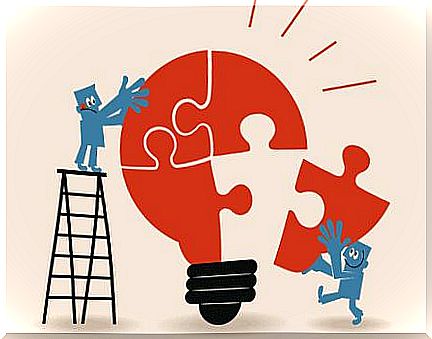Learn About Our 8 Basic Psychological Processes

One resource we have to adapt to the world is our behavior. This allows us to modify our environment and our reality so that we can adapt to what happens. We know that our behaviors are mediated by internal mental processes, but what are these mental processes? Here come our 8 basic psychological processes.
The 8 basic psychological processes are: (a) Perception, (b) Learning, (c) Language, (d) Thought, (e) Attention, (f) Memory, (g) Motivation and (h) Emotion. Throughout the article they will be exposed individually, but these processes are highly related to each other. Although they retain their terminological independence, many of them could not exist without the others; so, it is better to understand this distinction as an artificial classification that facilitates scientific work.
The 8 Basic Psychological Processes
1. Perception
Within the basic psychological processes, perception is responsible for us to have an “image” of the reality that surrounds us, as this gives us information about external stimuli through the senses.
Perception is responsible for organizing and giving meaning to any sensory stimulus. The function of this process is obvious: knowing the environment allows us to move and interact with it, basic aspects to achieve an efficient adaptation.
2. Learning
Here we have the process by which we modify and acquire knowledge, skills, experiences, behaviors, etc. It works through what happened in the past, we learn to relate behaviors with their consequences, so it is closely related to memory.

The study of learning is given largely by the psychological branch of behaviorism, which provides us with theories of classical and operant conditioning; these explain the mechanisms through which we learn.
This process is useful because it allows us to vary our behavior repertoire according to what happened in the past, something that helps us to respond more adaptively in current and future situations.
3. Language
The human being is a social being, so language is the process that provides us with the ability to communicate with others. This communication, in the case of humans, is carried out through a complex symbolic code, the language or language. The complexity of our language allows us to accurately describe almost anything, whether past, present or future.
The usefulness of this process is given by our need to maintain complex social relationships that allow us to survive in a hostile environment. Language offers us a mode of communication broad enough to sustain human societies.
4. Thought
Here we are facing a very complex process that in psychology is defined as responsible for transforming information in order to organize it and make sense of it. The study of thought began with Aristotelian logic, but this was not effective for its analysis, because the human being did not reason with logic.
The function of thought today remains a controversial issue. This is, in part, due to the terminological confusion around it. Even so, the most accepted idea is that its objective is to act as a control mechanism in the face of situations that are presented to us.

5. Attention
Attention is the process in charge of focusing our resources on a series of stimuli and ignoring the rest. This is because we receive a lot of stimuli that we cannot attend to at the same time.
The attention process is adaptive because, if it didn’t exist, we would be lost not knowing what stimulus we should react to. It is paradoxical that the self-imposition of a cognitive limitation implies an evolutionary adaptation, but that is how it is.
6. Memory
The basic psychological process of memory allows us to encode information to store it and then retrieve it. We are facing an essential process that is closely related to all other processes.
Memory allows us to recall explicit information, such as which is the capital of France, or procedural information, such as riding a bicycle. Memory exists because it is very useful to have information about our past experiences so that we can reason and act on future events. Furthermore, without this process, the other basic psychological processes would not exist, as they all have strong memory support.
7. Motivation
Among the basic psychological processes, motivation is responsible for providing the body with resources to carry out the behavior. It is the process responsible for activating the body and putting it in an ideal state. Another important aspect of motivation is its directionality; not only prepares the body, but also takes charge of directing the conduct among the possible options.
The function of motivation is to make the individual direct the conduct towards their goals and objectives, and to prevent them from remaining still without any behavior. It is a process very much related to emotion and learning.

8. Emotion
Emotions are reactions to external stimuli that allow us to guide our behavior and act quickly in response to the demands of our environment. Emotions have a triple component: (a) somatic, would be the physiological changes that cause the emotion, (b) behavioral, here would enter the aspect of behavior that triggers the emotion and (c) feeling, would be the experience of the individual’s subjective emotion .
The function of emotion is to manage our behavior quickly and efficiently. Most decisions lack the importance necessary to devote high time and resources, and that’s where emotion plays a role. It is important to understand that any decision is mediated by our emotions to a greater or lesser degree.
In this article, we expose the basic processes in a very superficial way. All of them are subjects of study that are extensive and in great detail. The intensive study of each one of them gives us the basic information to understand the behavior and mental processes of the human being.









